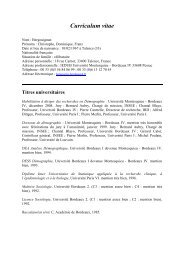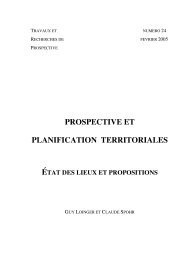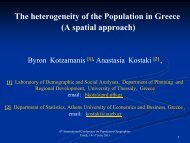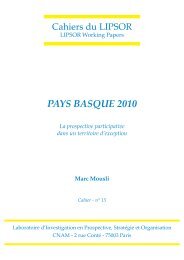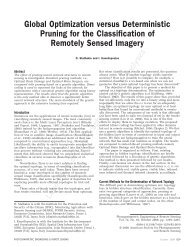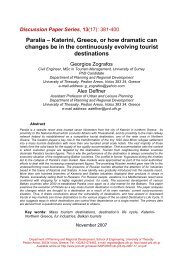<strong>International</strong> <strong>Journal</strong> <strong>of</strong> <strong>Architectural</strong> <strong>Research</strong>Pantoleon SkayannisDemocracy party 4 (as <strong>of</strong> March 2007) seemed in the beginning insecure to proceed with publicworks, let alone planning. Yet at a later stage it seemed to catch up with the Olympic momentumand to start the procurement <strong>of</strong> new mega transport projects, once more not in alignment with theup to then master planning <strong>of</strong> the city. There was a point when re-planning the strategy forAthens was becoming an inescapable requirement.In this conjuncture, in April 2009 a new regulatory master plan prepared under thesupervision <strong>of</strong> ORSA was presented by the minister <strong>of</strong> YPEXODE G.Souflias (2009) (fig.6).According to this plan, the main goals were a) sustainable spatial development from theenvironmental and cultural point <strong>of</strong> view, b) balanced economic development, competitivenessand strengthening <strong>of</strong> the international role <strong>of</strong> Athens, and c) Improvement <strong>of</strong> the quality <strong>of</strong> life in acohesive and friendly city.Figure 6: The 2009 Regulatory (Master) Plan <strong>of</strong> Attiki-Athens(Source: http://www.organismosathinas.gr).As in most master plans, such general goals are widely accepted but the “devil is hidden in thedetails”. The plan was accused <strong>of</strong>, while advocating for the concept <strong>of</strong> compact city, it wasincorporating into the city an area <strong>of</strong> more than 200 mill sq. m. Even the ministry <strong>of</strong> Agriculturethought that this plan was not environmentally sound (Hadjigeorgiou, 2009). As new electionsappeared in the horizon, the law draft was never produced for vote in the parliament 5 . In October2009 new elections were held and the New Democracy government was replaced by PASOK.In-between, a basic change was the slow continuation <strong>of</strong> some <strong>of</strong> the post-Olympicprojects (e.g. the extension <strong>of</strong> the metro lines). This situation eventually accentuated. As theeconomic crisis approached, projects were gradually abandoned (Thessaloniki submergedtunnel) or held back (Athens metro extensions). During this period, the city and especially thecenter started to undergo an unprecedented crisis, as the main economic crisis deteriorated. Post2010, this crisis has brought about changes in the social structure <strong>of</strong> the center with multifacetedconsequences.According to Economou, Skayannis, Deffner, et al (2012), the problems <strong>of</strong> the center <strong>of</strong>Athens have their origin in the early ’90s or earlier (e.g. lack <strong>of</strong> comprehensive city planning, highdensitybuilding, green space deficit, old building stock, low quality <strong>of</strong> public spaces, lack <strong>of</strong> thenecessary urban infrastructure, urban sprawl and suburbanization). Other problems are morerecent (e.g. increasing criminality, drug trade and prostitution, illicit trade, closed shops,abandoned buildings, increase in the number <strong>of</strong> homeless on the streets and impoverishment <strong>of</strong>a significant number <strong>of</strong> the population). The latter have been caused either by heavy migrantinflows in the city <strong>of</strong> Athens or/and by the effects <strong>of</strong> the current financial crisis on urbanpopulation. The immigrants problem has developed to a major concern, as has got out <strong>of</strong>proportion by all standards. This influx is a combination <strong>of</strong> two factors, namely the economic and4 New Democracy: a liberal democratic conservative party founded in 1974 by Konstantinos Karamanlis.5 Regulatory (Master) Plans <strong>of</strong> Cities in Greece pass as Laws in the Parliament.Archnet-IJAR, Volume 7 - Issue 2 - July 2013 - (192-205) – Selected Papers198Copyright © 2013 Archnet-IJAR, <strong>International</strong> <strong>Journal</strong> <strong>of</strong> <strong>Architectural</strong> <strong>Research</strong>
<strong>International</strong> <strong>Journal</strong> <strong>of</strong> <strong>Architectural</strong> <strong>Research</strong>Pantoleon Skayannispolitical migration reasons and the fact that due to European legislation, immigrants are notallowed to be transferred to other European countries and are stuck in Greece. Low, unpaid andmostly black labor deprive the state from potential resources and result into low social welfarepossibilities and danger for public health conditions. These problems pose manifold risks,primarily to public health and safety but also to entrepreneurship and property and to the quality<strong>of</strong> life as well.As a consequence, over the last years, the inner city <strong>of</strong> Athens (the historic andcommercial center) has been changing in a rapid and hostile way, suffering from an increasingdecline. Rising crime and lawlessness have reached “crisis proportions” in downtown areas, whilethe concentration <strong>of</strong> legal and illegal immigrants in some neighborhoods has led to concern aboutthe creation <strong>of</strong> ghettos in the heart <strong>of</strong> the city. At the same time, the economic crisis has ledhundreds <strong>of</strong> stores to close down, to the increase <strong>of</strong> unemployment, and to the breakdown <strong>of</strong>social services and the degradation <strong>of</strong> the quality-<strong>of</strong>-life standards in many traditional middleclassdistricts (Economou, Skayannis, Deffner, et al, 2012), as well as allegedly to serious landspeculation activity in view <strong>of</strong> a possible future gentrification process. This situation has triggeredthe activation <strong>of</strong> groups <strong>of</strong> the extreme right, something that has increased the fragility <strong>of</strong> thesocial tissue.Given the above, there is a question whether the problems <strong>of</strong> the city –in crisis- would bereasonable to be faced with tools from the sphere <strong>of</strong> physical planning, especially <strong>of</strong> the urbandesign scale, or from those <strong>of</strong> socio-economic development planning. This problematic andcontradiction was unavoidably transferred to the next plan for Athens that was to be elaboratedquite soon.THE NEW REGULATORY MASTER PLAN OF ATHENS-ATTIKI 2021 (RPA-2021)The new government (from October 2009 onwards), as all governments do, changed the Ministerappointed members <strong>of</strong> the executive committee <strong>of</strong> ORSA 6 . The new committee set out to preparea new regulatory master plan that was completed in 2011.While maintaining the same goals as the previous plan though highly emphasizing theconcept <strong>of</strong> the compact city, the new plan included different, some new, specialized goals whichwere: the promotion <strong>of</strong> the image <strong>of</strong> Athens as a Mediterranean capital with emphasis oncivilization, policies for social cohesion, reconstruction <strong>of</strong> the production structure, restriction <strong>of</strong>unauthorized building, strengthening and redistribution <strong>of</strong> development resources, establishment<strong>of</strong> green belts and ecological corridors, urban regeneration with recycling <strong>of</strong> land and housingstock, vivification <strong>of</strong> centrality, strengthening <strong>of</strong> sustainable mobility, valorization <strong>of</strong> the sea front,and improvement <strong>of</strong> the system <strong>of</strong> spatial planning and governance (ORSA /YPEKA, 2011).Some <strong>of</strong> these goals, certainly reflecting the new realities <strong>of</strong> the crisis, were lessconventional than those <strong>of</strong> previous plans, while the procedure for the preparation <strong>of</strong> the RPA2021 plan included extensive consultation with various social actors and stakeholders. However itdid not include an effective system <strong>of</strong> public consultation with individual citizens. Despite the factthat all such proposals at some stage have to be publicized in the internet and that there is aprovision for the general public to electronically submit their opinions, this never happened withthis plan, as the ministry proved indecisive to proceed with it due to contradicting pressures fromthe various stakeholders.6 Out <strong>of</strong> the seven members <strong>of</strong> the executive committee <strong>of</strong> ORSA, four are appointed by the Government and three bythe local authorities (municipalities, etc.).Archnet-IJAR, Volume 7 - Issue 2 - July 2013 - (192-205) – Selected Papers199Copyright © 2013 Archnet-IJAR, <strong>International</strong> <strong>Journal</strong> <strong>of</strong> <strong>Architectural</strong> <strong>Research</strong>









